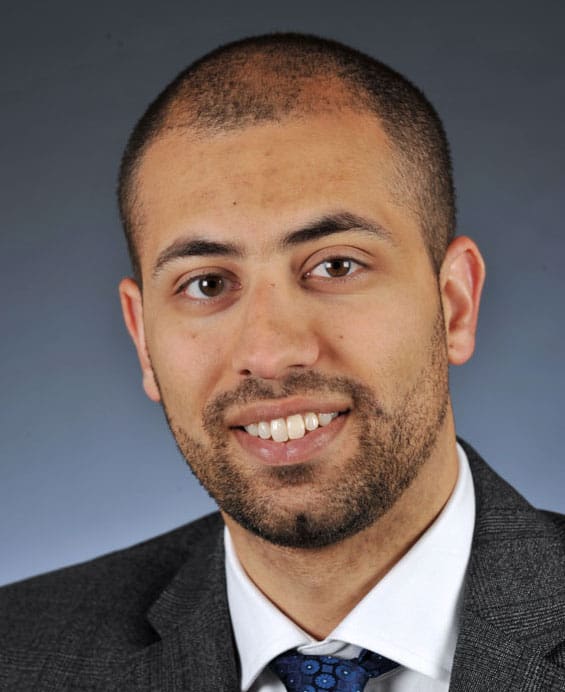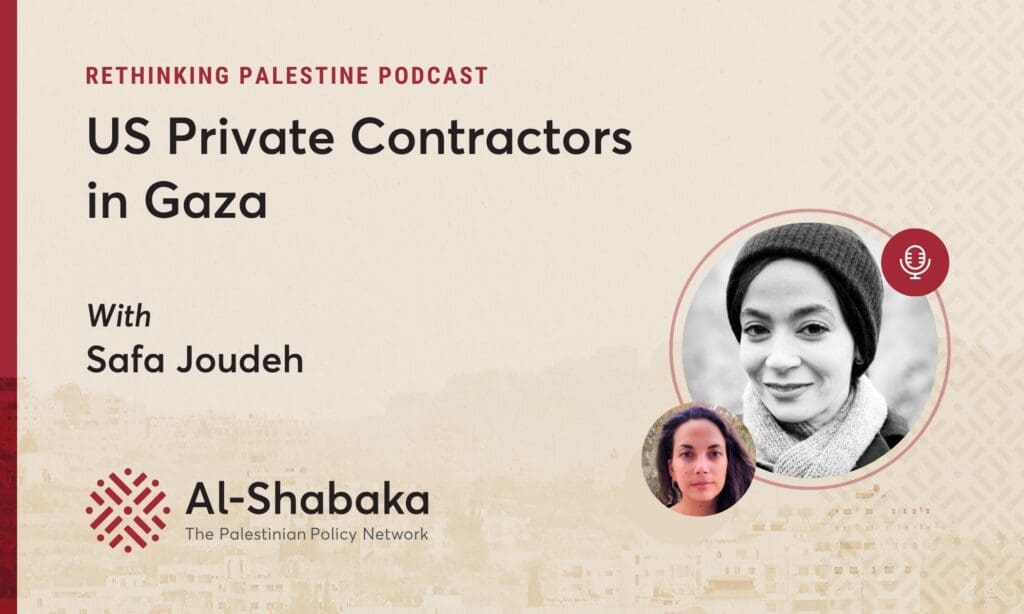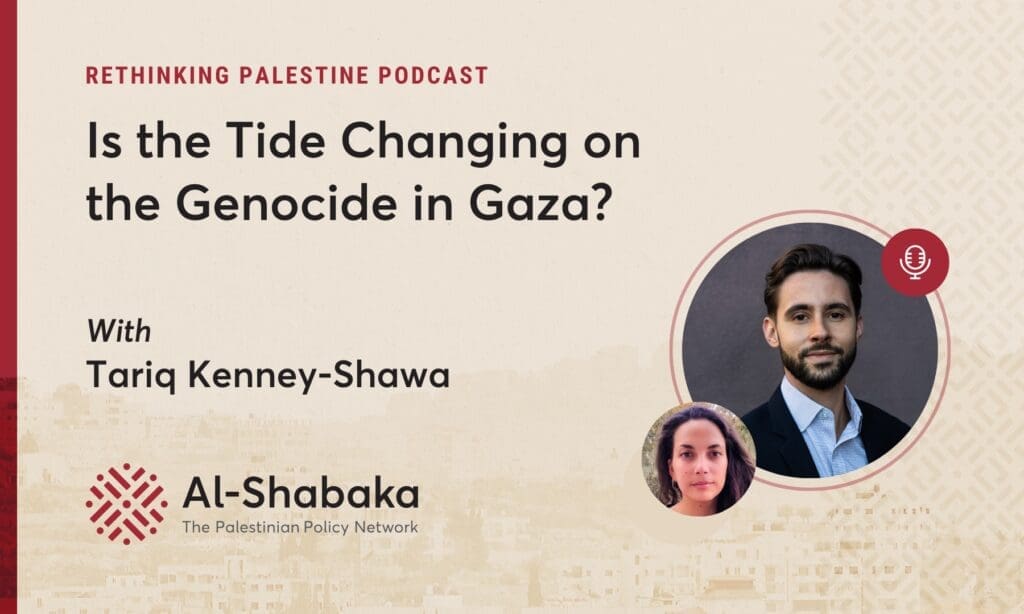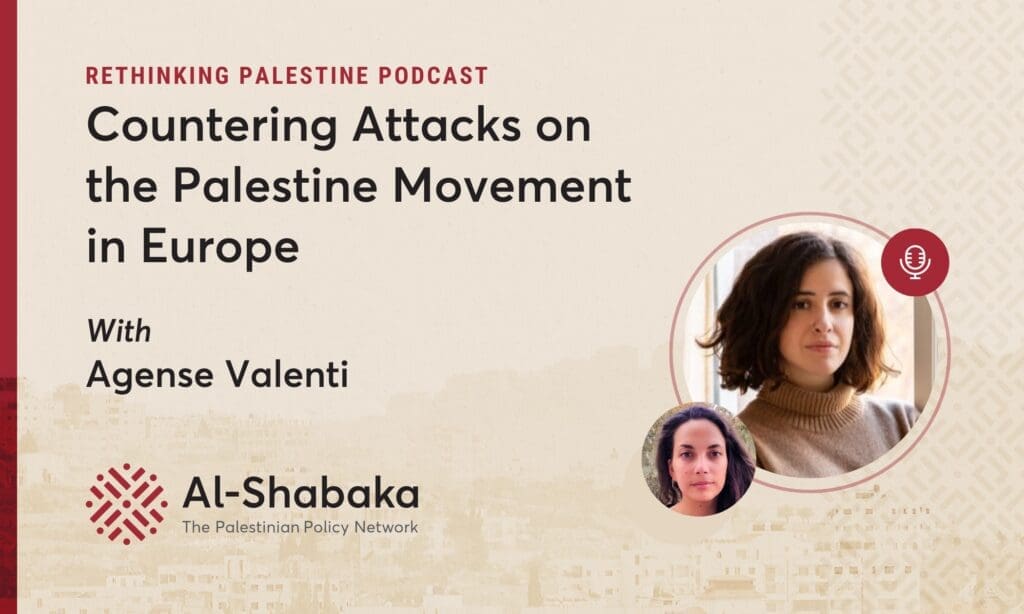About This Episode
Episode Transcript
The transcript below has been lightly edited for brevity and clarity.
Abdullah Al-Arian 0:00
When we look at, for instance, what Israel has done through sport is that it’s not just using it to deflect attention away from ethnic cleansing, apartheid, or occupation. I think what the Israeli state has explicitly tried to do is use it to end its own isolation and using its participation even to further specific political goals.
Yara Hawari 0:23
This is Rethinking Palestine, a podcast from Al-Shabaka the Palestinian Policy Network. We are a virtual think tank that aims to foster public debate on Palestinian human rights and self-determination. We draw upon the vast knowledge and experience of the Palestinian people, whether in Palestine or in exile, to put forward strong and diverse Palestinian policy voices.
In this podcast, we will be bringing these voices to you so that you can listen to Palestinians sharing their analysis wherever you are in the world.
Football or soccer is by far the most popular sport in the world, and its matches and competitions bring people together and push people apart in ways unrivaled by other sports. In this episode, we are taking a look at football in Palestine and the wider region, a timely topic because the World Cup in Qatar has officially begun this last month following years of controversy.
Indeed, when FIFA announced in 2010 that Qatar would hosts the 2022 Cup. There were accusations of corruption and vote buying. Since then its also faced intense scrutiny from human rights groups around its treatment of migrant workers, with some even calling it akin to modern day slave labor. The issue of this year’s World Cup has placed football at the center of many political discussions.
And this might be contrary to the popular discourse, that sport is separate to politics, yet across the region we have seen football politicized in different ways for decades. To discuss all of this and more, I’m joined by Abdullah Al-Arian, an associate professor of history at Georgetown University in Qatar. He’s the author of Answering the Call: Popular Islamic Activism in Sadat’s Egypt and the editor of Football in the Middle East: State Society, and the Beautiful Game. He’s also editor of the Critical Currents in Islam page on the Jadaliyya E-zine. Abdullah thank you for joining me on this episode of Rethinking Palestine.
Abdullah Al-Arian 2:24
Thank you for inviting me.
Yara Hawari 2:35
So I want to start off with a question on the World Cup in Qatar.
I mentioned some of the controversies that have arisen and I was wondering if you could tell us a bit more about them.
Abdullah Al-Arian
So just by way of background or context, back in 2009, Qatar put this very improbable, unlikely bid to FIFA among many other countries that were vying to be able to host the World Cup all the way in 2022.
They made a lot of promises as far as preparing the country, paving the way, installing all of the infrastructure needed to host the games and there were a lot of doubts, of course. And so when the actual bid was successful in 2010, in December, when FIFA announced that it indeed had chosen Qatar, there was a mixed set of reactions.
On the one hand, you had Qatari officials, people who were part of the Qatar camp in terms of lobbying on behalf of the bid people like Zinedine Zidane. Who are all basically saying this is a massive achievement, not just for Qatar, but for the region. This is proof that the game belonged to everyone in the world.
This is a world cup for everyone as the chairman of the bid put it in his own words. So there was a sense of euphoria, at least among people within the region especially who were very excited at the prospect of having the entire footballing world hosted in the region.
And on the other hand, of course, you also had a wide range of reactions who were very incredulous, who were in disbelief, who were shocked, and might even say disgusted by the outcome of the bid. Especially given some of the open questions, right? So things have to do with the climate, right?
So this is a summer tournament. It’s always been played in the summer months, and all of a sudden you’re talking about a place where temperatures reach something up to 50 degrees in July and August. Then there’s the question of, it’s the smallest country ever to be chosen, so where are you going to put all of these matches?
We’re talking about a tournament that’s been hosted in places like Russia, Brazil, the United States, these massive near half continents, essentially where the matches are spread out hundreds of miles apart. Then there were questions about the actual infrastructure itself, right? There were no stadiums that were built at least that could house matches with 60, 70,000 fans.
And not to mention an airport, the hotels for all of the tourists coming in, the fans coming in for the matches. So there were so many different questions, and then of course we start getting into questions about the process itself, and people were wondering, why the FIFA delegates would make this selection?
Investigations revealed a lot of corruption within FIFA. There were accusations about bribery, about whether there was vote trading and all kinds of backdoor deals that were being made around this bid. In particular, some FIFA officials eventually would be not just investigated, but even charged with actual crimes in US courts.
Nothing was ever definitively or substantively proven specifically about Qatar’s role, but there was certainly a lot of question marks that cast a shadow over the entire process going forward, given those kinds of corruption, alleg. Then we get into the logistics behind how are we actually going to install all of these facilities.
Knowing what we know about the migrant labor governance system in the Gulf, the Kafala system, which has been in place really going back to colonial times when the British ruled over this region. There were very strict laws governing the sponsorship of workers, mostly coming from south Asia and Southeast Asia, and some from East Africa as well.
What was that going to look like with a country that was up against the clock that had a 12 year window to build a massive amount of infrastructure from the metro system to the airport, to the seven stadiums that would eventually be built, the dozens of hotels and all of that would clearly put a strain on workers whose rights were not really being protected or even seen as a priority in light of all of these things. So all of these questions, I think, there were even other things that we might consider a little bit more shallow or superficial having to do with the cultural differences, right?
What does this mean for fans for whom consuming alcohol is such a central part of the fan-going experience in a country that more or less regulates or has an outright ban on public drinking, for instance? So these were all the kinds of questions that were being asked at the time.
I think in the initial stages the officials behind the World Cup tended to take a very conservative approach, not really responding, being a bit dismissive of a lot of the concerns, and allowing the narrative to be shaped largely in Western media outlets. The Guardian, within days of the bid having been won, issued a column saying something along the lines of letting the Qatar World Cup not be built on brutality.
We’ve since seen many, many other kinds of expressions like this over the years. There’s even been the role that Qatar’s rivals in the region, especially the United Arab Emirates, but also Saudi Arabia leading up to the blockade in 2017, that they played a role in trying to air out some of these questions in the Western press.
And so that’s helped heap on some of the criticism. There’s been the role of human rights organizations like Amnesty International Human Rights Watch, more recently the International Labor Organization, which was granted access and has opened an office in Qatar for the last several years. So all of these different actors have played a role in terms of trying to get around some of these major questions.
And of course, more recently, Qatar has begun to at least address them more substantially. So we’ve seen things, for instance, like a complete reform of the Kafala system allowing workers to change jobs without having the permission of their current employers, instituting a new minimum wage, having other kinds of external reviews.
I’ve met with union leaders here. I’ve met with members from various other international labor organizations and institutions that have been present in Qatar for the last several years who have noted the progress but with caution, right? I think everyone has taken the attitude of the actual signals have been better, but the implementation leaves a lot to be desired.
And we’ve seen still instances of evictions, of wage theft, of retaliatory deportations. This is clearly still very much a work in progress in terms of the actual reform of the labor system and something that I think has to continue well beyond the World Cup. So even after the attention of the world shifts elsewhere after these games. There has to be a sustained effort.
And for that reason, I think anytime we talk about change, whether on this issue or on many different issues across our region, it’s never sufficient to just distill them down to a pressure campaign coming from the outside, right? So this should not just be simply a matter of hysteria in the Western press or a temporary mobilization by parachute activists from international human rights groups. This has to be something that has been sustained through partners from within, from local actors movements here and I think there’s been a failure to recognize who those actors are, that this is not simply just a question of the state waving a magic wand and then solving all of these problems, but rather working with a number of different actors that all have a role to play.
And I think that’s been what’s missing in this conversation as far as the role of the broader forces that govern the flow of capital and labor beyond this region and the extent to which Qatar is plugged into a system that is deeply faulty, exploitative, problematic on so many levels rather than just treating this situation in total isolation as a case of exception.
So I think that’s something else that has fallen short in the way that we’ve looked at these questions.
Yara Hawari 10:38
Abdullah that last point you mentioned was incredibly important because we see this time and time and again, that there’s hysteria around all these issues and it’s very, very shallow.
And as you mentioned, there is a broader system of capital and labor that works to exploit people around the world and Qatar is simply tapped into that and is one of the many areas where these problems persist.
But I want to turn to your latest book, Football In the Middle East, published by Hurst. In the introduction, you state that the story of football in the Middle East is inseparable from the broader experiences of the region and the destinies of its people. What did you mean by this? And perhaps you can give us some concrete examples.
Abdullah Al-Arian 11:22
So this book was an edited volume that brought together over a dozen scholars that had a couple of meetings, discussed their various areas of interest and research, and went off and pursued a number of different projects.
And so we collected these in 12 chapters that give a good overview, I would say, of a number of the more pressing or interesting, and in some cases also historic issues governing the question of football in this region. And so one of the things that I wanted to make sure that we included, and maybe this comes from my background as a historian, but I wanted to give that deeper context, that this is not just a question of something that just popped up because the World Cup happened to fall in Qatar’s lap in the last decade or so, some would say undeserved.
And again, going back to your first question, I mean, one of the things that we heard quite often is, well how can we give the World Cup to a region that has no footballing history? And I think that among the many different questions, I think is the one that is the least founded in terms of when we actually look at the story of football in the region that it’s so interwoven with so many other aspects of the region’s history, not the least of which is the colonial experience itself because of course, this is how football is introduced. So to ignore the history that football has is to almost erase the entire colonial experience altogether because it signals this idea that this game, which of course was invented in Europe, which has expanded globally which of course has roots in the settler colonies that Europe established, especially in South America, the other part of the world that we tend to associate with the game.
But then it erases that entire relationship that the Middle East has had with colonial powers. And so if we actually look back at the origins of the game’s introduction, it really comes along as a product of colonial education and the idea of instilling structure, discipline, physical fitness as a means of creating these modern citizens, especially among the elites, the modern western oriented elites within different Arab societies. And so this was very much part and parcel of what colonial rule did.
We know a lot of courses about colonial education in terms of the various school subjects. We tend to focus less on physical education, but certainly, football as a sport was meant to be a force of modernization among other things. But I’m always quick to point out in these discussions is the fact that just because this was imposed in such a way does not mean that it doesn’t eventually take on the life of its own.
And I think this is always true of popular culture that it adapts, it shifts, it manifests in various forms. And we see that not necessarily just among the elites, but among the broader societies in the Middle East, that when the game reaches them, they redefine it in ways that are much more suitable to their own identities, to their own environment, to their own societies.
And over time it becomes actually a force that then allows for the building of solidarity networks, of organization in the anti-colonial nationalist struggles. And so we see this in places like Egypt, where the creation of the Egyptian League coincided with the establishment of a class of Egyptian elites that was waging its fight for independence.
We see it, for instance, in a place like Algeria in the late 1950s where the FLN, which was fighting the Algerian revolution against France, established as a team in exile, made up of mostly Algerian players coming out of the French League who decided to basically leave, give up these really lucrative and successful careers, to fight for the independence of their home country.
And so they established this FLN traveling team that went around the world playing friendly matches against other national sides to raise awareness about the revolution in Algeria. In fact, it outraged the French so much that they lobbied FIFA to punish any national team that played against the FLN at the time.
And so we see the way that football becomes interwoven within the anti-colonial struggles. The development of national identities once all of these countries become independent. So for instance, even in a place like Qatar, the national league existed almost a decade before Qatar was even independent.
So it has even deeper roots than the country’s independence. And again, it’s seen as a means of organizing yourself politically, in a way, by having the experience in terms of organizing, clubs, leagues, competitions, all of the political, social, economic aspects that go into organizing a sport within a national context play a very significant role then going forward.
Fast forward then to just the last decade or so, we see that it also played a role in the uprising of 2010, 2011 and beyond. And so in a place like Egypt, I’m sure many of us heard the stories about the Ultras, right? The fan groups for various clubs, whether Al Ahly or Zamalek in Cairo who stood firm in the face of hosting Mubarak’s security forces who attempted to crack down on the anti-authoritarian protests that were happening at the time.
So there’s a sense that there are spaces within societies, especially within this authoritarian context in which it’s not really safe to organize in an explicitly political fashion. And so people rely quite often on other social bonds and cultural bonds that they have, including things like being fans of football clubs and being able to use those bonds of solidarity as a means of not just discussing politics openly, but then also mobilizing when the opportunities demanded or called for it.
And we saw it most recently, and there’s a chapter in the book actually specifically about Algeria in the 2019 Hirak movement in which they used the themes, the anthems, the songs, the chants as well as the art displays from their football matches in the protest against Bouteflika’s attempt to run for a fifth consecutive term. And so once again, we see that these things tend to go hand in hand. And I think for most of us listening, we sort of take for granted the idea that football has power to mobilize. But I think we’ve certainly seen it its impact very much in the region over the last several decades.
Yara Hawari 17:36
If you are enjoying this podcast, please visit our website, www.al-shabaka.org, where you’ll find more Palestinian policy analysis and where you can join our mailing list and donate to support our work.
I think that’s such a significant contribution of this book that you will lay out both the colonial origins of the sport in the Middle East, but also how it’s been used as a space to, to mobilize against oppression.
When I was reading it, I saw something that was both interesting and absurd at the same time. In Lebanon, you write that the provision was passed in the late 1990s for goalkeeper to be added to the list of nearly 40 professions from which Palestinian refugees have been barred from, and the discrimination doesn’t stop there. The Lebanese Football Association has quotas on the number of Palestinian players, higher registration fees and other kinds of restrictions.
And I think this really demonstrates par excellence, how football can be used as this political tool of furthering repression and discrimination. Can you tell us a bit more about that?
Abdullah Al-Arian 18:46
So this actually comes out of a chapter by Danyel Reiche, who was a professor at the American University of Beirut at the time. So he did some on-the-ground research about the situation of Palestinian footballers in Lebanon. And he writes about what he calls the triple periphery, right? The idea that Palestinians there, on the one hand, are extremely limited from playing in the Lebanese League, they’re also excluded from being able to play for their national side because of course, Palestinian refugees are not allowed to go back to Palestine.
They’re denied that right of return, so they can’t actually compete with the national team. And then of course, because their refugees, they also can’t really go anywhere else, right? That their mobility is completely limited from being able to say go play in leagues in Africa or Asia or Europe. And so that triple periphery as he calls it, I think in many ways is an emblem of exactly what it means to be a Palestinian refugee in the Lebanese experience.
I think this is a useful sobering take given what I just said in my last answer about the power of football to mobilize and to change that we also have to recognize that in many instances, popular culture, or in this case sport or football in particular, can also just hold a mirror up to the realities that exist within a society.
And so what happens, in the Lebanese case is very much a reflection of what the Palestinian experience is like in Lebanon, at large, right? Across the broader society, we know that Palestinians, many hundreds of thousands of them who were forced out of their homeland, ethnically cleansed in 1948 who ended up in Lebanon, have been subject to some of the worst conditions of any refugee population anywhere.
Forced to live in camps, denied citizenship, but even denied very basic rights for their survival in the Lebanese context. Embroiled of course in the Civil War beginning in the mid-1970s. And so seeing their rights diminished even further as a result of the very tenuous sectarian balance that exists already within the Lebanese state.
And so then the situation of football becomes really interesting as a way to see further the extent to which that discrimination exists. And so whereas initially they were allowed to compete within the Lebanese League later on they were considered to be foreign players, right? So if every team has a quota of how many players that are allowed to have are not of Lebanese origin and Palestinians, despite the fact that in almost every case they’re born and raised within Lebanon.
So we’re not talking about foreign players who are imported from other countries, but rather Palestinians who live within Lebanon, and yet they’re still put into this category. Later that was altered slightly to allow for at least one Palestinian player to be counted within the local players, but yet any additional players after that would then be considered to be foreign players. The goalkeeper provision is really an interesting one because on the one hand, again, as you mentioned there’s already so many professions that Palestinians in Lebanon are not allowed to have, right? So they’re not allowed to work in medicine or in law or in a number of other especially white-collar professions.
There are laws explicitly banning them from such jobs. And at the same time, all of a sudden you had this flurry of Palestinian goalkeepers throughout the 1990s and all of a sudden the Lebanese national team was concerned that there weren’t enough Lebanese competing for the goalkeeper position of the national team. And so they decided to simply banish Palestinians from being able to play that role in the leagues in order to encourage more Lebanese to take on that position. But again, it ends up being incredibly discriminatory and very much a sign of what we’ve come to see from the Lebanese state in terms of its discrimination against Palestinians.
Yara Hawari 22:27
So staying on the topic of Palestinians and football, there’s also a chapter in this book about how the BDS movement has used football to mobilize against Israeli apartheid. Could you tell us a bit more about this chapter?
Abdullah Al-Arian 22:40
Yeah so again, this is another colleague who’s written a chapter in the book, specifically on the question of BDS and football. And that’s Aubrey Bloomfield, who’s looked at this question extensively. And again, I think there’s a lot that we can take away from past experiences, right? So there are always questions about boycott. There are always questions about what is the role of politics in sports. That’s something that isn’t really new.
And I think to a certain extent, the sports boycott of apartheid South Africa provides a really interesting model. In another chapter, I go back to the 1950s and 60s when Gamal Abdel Nasser decides to spearhead the establishment of the Confederation of African Football. There are only four countries that are invited to compete at the first African Cup.
One of those is South Africa. But once they insist on fielding an all-white team and preventing any black players from competing with the South African football team, immediately CAF makes a decision to banish the team. And in fact, it was never reinstated for several decades until the fall of apartheid.
And so CAF basically went on and existed for many decades without South Africa’s participation because it was very explicit in its endorsement and use of apartheid. And I think there’s a model there that a number of activist movements and organizations, and of course all of Palestinian civil society, which has endorsed the BDS movement going back well over a decade, have all come together and basically endorsed the same position vis-a-vis the Israeli state and its competitions or its participation in international competitions.
And again, there are several elements to this question. One of which I think is interesting is people who’ve been looking more recently at the question of sports washing, this has become a recent buzzword.
The idea is that states are using their footballing interest or their sports interest as a means of deflecting attention from their most abusive policies. So I think from what I can tell at least, it seems like sports washing is actually you short-changing the conversation a bit. Because if we’re talking purely about the idea of using sports as a deflection or distraction, I don’t think that actually quite captures what many of these states are doing, Saudi Arabia included.
But also when we look at, for instance, what Israel has done through sport is that it’s not just using it to deflect attention away from ethnic cleansing, apartheid or occupation. I think what the Israeli state has explicitly tried to do is use it to end its own isolation and using its participation even to further specific political goals.
And so one of the examples is when Israel planned to play the Argentinian National Football team in the lead-up to the 2018 World Cup. And so this was supposed to be a warm-up, friendly match for Argentina. It was scheduled to be played, I believe in Haifa or somewhere else. And then at the last minute and again, this was just weeks after the Trump administration had moved the US Embassy to Jerusalem thereby cementing the US acceptance of Israel’s illegal annexation of the city.
And so the Israeli Football Association moved the match to Jerusalem to be played almost as a means of yet again affirming its sovereignty over the city. And due to a massive pressure campaign from activists, from within Argentina, from within Spain, where of course Argentina star, Leo Messi plays, and from around the Arab region, and even from within Palestine.
Eventually, the Argentinian national team pulled out of playing in that match. And in fact, the same thing happened once again this year in 2022. Another friendly match was canceled as a result of Israel’s actions toward Palestinians. So I think it’s crucial to see the extent to which. This isn’t simply about deflecting the actions, but in fact, sport has been used quite aggressively as a means of cementing certain claims.
The same can be said for instance, about Puma, the sportswear company that, of course, has been sponsoring clubs in illegal Israeli settlements in the West Bank. And of course, there’s a massive boycott campaign of Puma because this only serves to legitimize the illegal annexation and appropriation of Palestinian land.
And so I think the BDS movement in this regard has found a way to position itself at least as a means of trying to shine a light on some of these abusive practices, rather than allow the state to deflect attention or even worse yet to affirm its sovereignty over territorial claims, or to shrug off any human rights abuses through the normalization that comes with playing against outside opponents or even bringing in a major sportswear brand like Puma into the settlements.
Yara Hawari 27:19
Thank you so much, Abdullah. You’ve made me think about football in a completely different way, and I think you’ve given our listeners a really important insight into how football has been used in the Middle East. Not only by oppressive regimes, but also those who tried to mobilize against these regimes.
Thank you so much for joining me on Rethinking Palestine, and we hope to have you back very soon.
Abdullah Al-Arian 27:44
Pleasure. Thank you for having me.
Yara Hawari 27:52
Thank you for listening to Rethinking Palestine. Don’t forget to subscribe and leave us a review. For more policy analysis and to donate to support our work, please visit our website, www.al-shabaka.org. You can also follow us on Facebook and Twitter.














